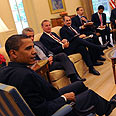
Peres' visit to the Oval this week
צילום: עמוס בן גרשום, לע"מ
Good cop, bad cop
Yitzhak Benhorin examines President Peres’ meetings with top US officials in Washington
WASHINGTON – Under the auspices of AIPAC’s annual conference this week, we got the first hints as to what is going through the minds of President Obama and his aides. At a time when Pakistan is burning and the economy is slumping, White House officials went to great lengths in order to free up precious time for three meetings between Peres and the American president, his VP Joe Biden, and Secretary of State Hillary Clinton.
The Mideastern issue is high on the agenda of US foreign policymakers: Obama has been speaking about peace in the Middle East since his first day in the White House, and has appointed a special envoy for the region a day after Clinton stepped into the State Department.
The Americans see a great opportunity for strategic change in the Middle East against the backdrop of the Iranian threat on Sunni Arab states. They are not pressing Netanyahu and are giving him the required timeframe needed to formulate his policy, yet they also do not hide their fear that the Netanyahu-Lieberman government would withdraw from the obligations made by Israeli governments in the past seven years – support for the two-state vision, ever since it was drafted by the previous Likud prime minister, Ariel Sharon.
Biden was sent Tuesday to play the role of the bad cop when he represented the administration in the pro-Israel lobby’s conference. In his speech before Israel’s 6,000 greatest fans in America, he conveyed the unequivocal message of the new administration: Two states, and a decisive demand to halt settlement construction. These are two fundamental demands that the Obama administration is unwilling to debate even. Obama’s popularity – among the Jews as well – in addition to the majority in Congress, grants him the ability to exert pressure on this front.
The question of settlements was raised in the preparatory meeting between Biden and President Peres in the White House. Peres sought to explain that Israel is not building new settlements, but that natural growth is a different matter. The government cannot order young couples to refrain from having children, Peres told the vice president.
Yet Biden is no rookie. After 36 years in the Senate, most of them spent at the Foreign Relations Committee, he is familiar with this argument, and he doesn’t buy it. The sense he and his administration colleagues share is that to this day Israeli governments misled the Americans, and that more construction in the territories must be prevented – or else, the possibility of establishing a viable Palestinian state would see its demise.
No need to waste time
After the meeting with the bad cop, Peres walked over to the Oval Office for his meeting with the good cop, President Obama. The latter again pledged to safeguard Israel’s security and the special friendship between the two states for the duration of his presidency.Obama and Peres had a 15-minute tête-à-tête and nobody really knows what was said during the conversation. Netanyahu hopes to find out. He was the one who asked Peres to be a sort of trailblazer, before Bibi himself arrives in Washington in two weeks. The objective was to lay the groundwork – to explain, allay fears, and provide breathing space - but no less importantly, Peres was asked to utilize his sharp feelers and warn about problems ahead.
The Obama-Peres meeting at the Oval Office was attended by Americans who know us like the back of their hand. The White House Chief of Staff, Rahm Emanuel, the son of an Israeli Irgun fighter who loves the state and believes it needs to be saved from itself, and General James Jones, the president’s national security advisor, who was sent by outgoing President Bush to examine Israel’s security needs in a peace deal. With him one needs to talk about real security needs, not old wives’ tales.
Jones’ and Emanuel’s position is incisive. For them, it’s quite clear what the final result would be and what the agreement would look like, and therefore it would be a shame to waste time on a long and tiring process. They want something that would stimulate the move. President Obama referred to it as “confidence-building steps” in his meeting with Jordan’s King Abdullah.
Israel will have to do something on the settlement front, or about improving the Palestinian freedom of movement in the West Bank. Netanyahu will have to come up with something creative. The Arabs will be asked to no longer sit on the fence and start undertaking open steps of normalization with Israel. It could be a meeting, a public message, or the opening of an economic mission, officials in Washington say.
Yet the more meaningful reward for Israel was presented by Emanuel in a closed-door session with AIPAC’s largest donors, as reported by Ynet: Progress in resolving the Arab-Israeli conflict – even for appearance’s sake – would help in advancing a solution to the Iranian threat.










